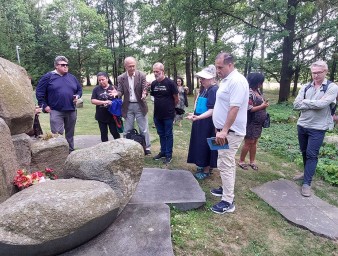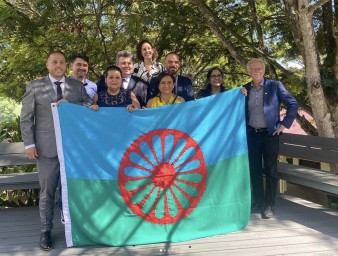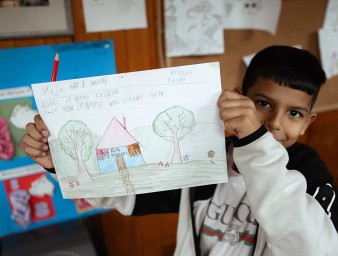Roma mediators in Moldova enable Roma families to enjoy their human rights
13 September 2024

When Raisa Demeniuk appeared in this Roma settlement one recent summer morning, a small group of Roma children dashed out of their cinderblock home and across the dirt courtyard to greet her. “It’s Raisa! It’s Raisa!,” they cried, as the parents joined the informal reception.
Known affectionately as Auntie Raisa, Demeniuk is a Roma community mediator, and today she is here to check on Galina Mihai and Vijai Rusov and their five young children. Before Demeniuk started to work with the family, this marginalized Roma family had no identity documents nor birth certificates, the children did not attend school, and the family was not eligible for health care and social protection benefits, factors that were deepening their already precarious livelihoods and social exclusion.
Demeniuk, who has undergone human rights training organized by UN Human Rights Moldova sorted out the family’s documents through local structures. Thanks to Demeniuk, the family’s older daughter now attends primary school, and two younger brothers go to kindergarten. When Galina got pregnant with her last baby, Demeniuk accompanied her to sign up at the health center. All the children are vaccinated, and the parents receive social benefits to help support their modest income as informal agriculture workers.
“I am very grateful to Auntie Raisa because she helped us with absolutely everything,” said Galina, 27, as she cradled her 6-month-old baby outside her home on the outskirts of the town of Slobodzia. “We are struggling, and I don’t know what we would do without her. She is a very good person.”
The Roma minority has long suffered from discrimination in all areas of life, from housing to education to employment to health care. A program led by UN Human Rights Moldova enables vulnerable Roma families from the left bank of the Nistru/ Dniester river to exercise their human rights and integrate into society through a network of trained Roma community mediators in the region.

Roma family: Galina and Vijai and their young children. © OHCHR/Vincent Tremeau
First established on the right bank of the Nistru/Dniester river, the initiative of Roma community mediators was expanded in September 2021 to the left bank, drawing on past successes and guided by international best practices. The program, which is part of the One UN Joint Action “Cross-river support to Human Rights” funded by Sweden, is having a real impact in promoting the human rights of the Roma, said Juliana Abramova, the Program Manager at UN Human Rights Moldova.
According to a recent report by the Office, more than 650 vulnerable Roma from the region have benefited in the last year from the services provided by the Roma community mediators, including better access to education, health care, social security, adequate housing and the job market, and also in obtaining legal documentation.
As in many European countries, Roma in Moldova often lack personal identity documents, which hinders their access to basic services and human rights, and perpetuates their marginalization and statelessness. Some Roma never obtain a birth certificate, as they find it difficult to overcome the administrative requirements of the State and have a low understanding of the value of ID documents, leaving entire families with children outside of any form of social protection or inclusion.
The program has proven an effective instrument to empower Roma. Through trainings and seminars organized by the Office in Moldova, Roma mediators learn how to solve many administrative obstacles and which authorities and structures they need to go for each administrative procedure. If they can't solve the problem and need special knowledge, they know where to ask for professional legal support.
Roma mediators are themselves members of the Roma minority and live in the communities, so they can communicate better with the families, know Roma values and traditions, and understand the challenges they face.
Addressing inequalities
The Office has also helped establish partnerships between Roma mediators and local structures and service providers such as schools, kindergartens, hospitals, outpatient services, employment centers, offices for documentation of the population, and social services to address Roma inequalities and discrimination and find practical solutions.
“The Roma minority is considered one of the most marginalized groups in Europe, and Moldova is not an exception,” Abramova said. “As part of the mandate of UN Human Rights in Moldova, we enhance equality and prevent and address discrimination of Roma on both banks of the Nistru/Dniester river.”
Abramova, who works closely with Roma community mediators in the region, said the number of Roma children enrolled at school and pre-school institutions in areas where Roma mediators work has increased significantly, and that school dropout rates among Roma children have decreased. In some localities, mediators contributed to launching extra-curricula activities to support Roma children in their homework and delivered basic lessons to Roma children with low performance rates.
Thanks to Roma mediators, there has also been an increase in pregnant Roma women registered with a doctor, allowing them to receive regular health care and checkups, Abramova said. Vaccination is up among Roma children, and adults are attending vocational training in higher numbers, which opens the door to legal employment, she said.

Roma community mediator Raisa Demeniuk. © OHCHR/Vincent Tremeau
Beyond helping Roma get access to basic public services, mediators like Demeniuk are seen as guardian angels by Roma families. They sometimes bring food or firewood to families, accompany mothers to see a doctor as many are illiterate, or stop by the house in case somebody is not feeling well. Mediators also step in to resolve conflicts between Roma and non-Roma children in schools or talk with school administration to make sure bus routes cover areas where Roma children live.
Demeniuk likes to remind Roma parents about the importance of children going to school and getting an educational degree. A longtime Roma activist before she became a Roma mediator, Demeniuk said the training organised by the Office in Moldova helped her get a broader understanding of human rights and how to claim Roma’s human rights.
“When I started working as an activist, I faced many issues trying to help Roma families, but I could not solve them because I did not know how,” she said. “When we finally obtained the documents, we applied and got the social benefits (for Galina’s family). It was a big joy for us. My fellow mediators also congratulated me.”
Roma community mediators
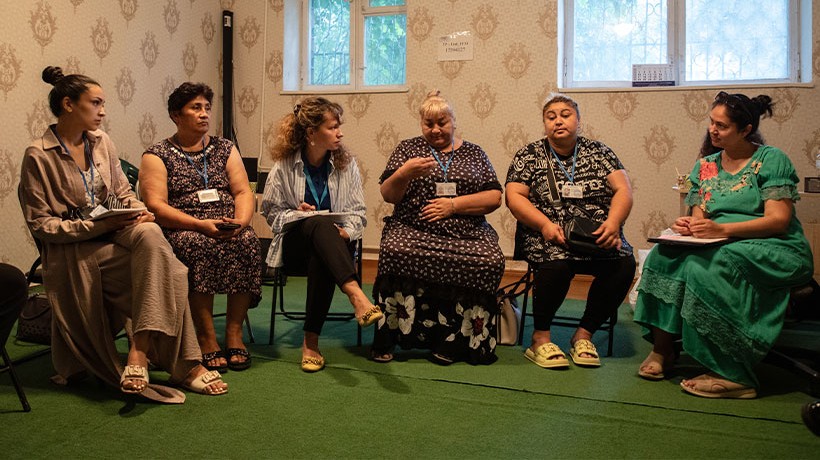
Roma community mediators meet regularly to discuss human rights challenges of Roma and come up with practical solutions. Roma mediators receive human rights training to assist families integrate into society. © OHCHR/Vincent Tremeau
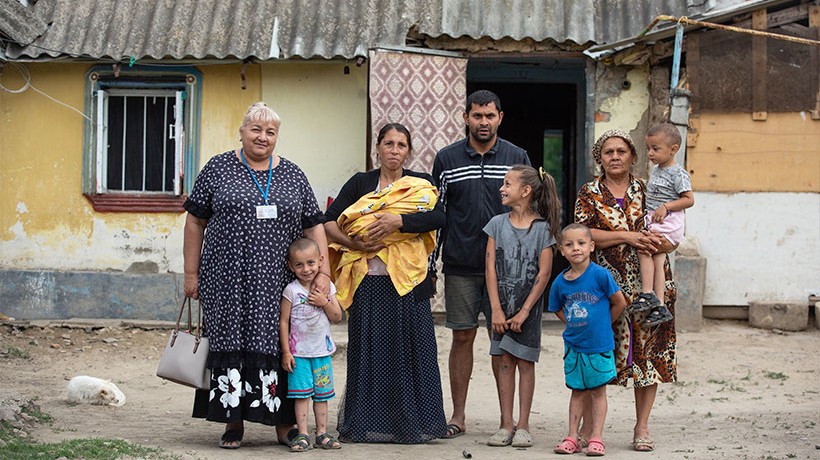
Beyond helping Roma get access to basic public services and obtain legal documentation, Roma community mediators are seen as guardian angels by Roma families. © OHCHR/Vincent Tremeau
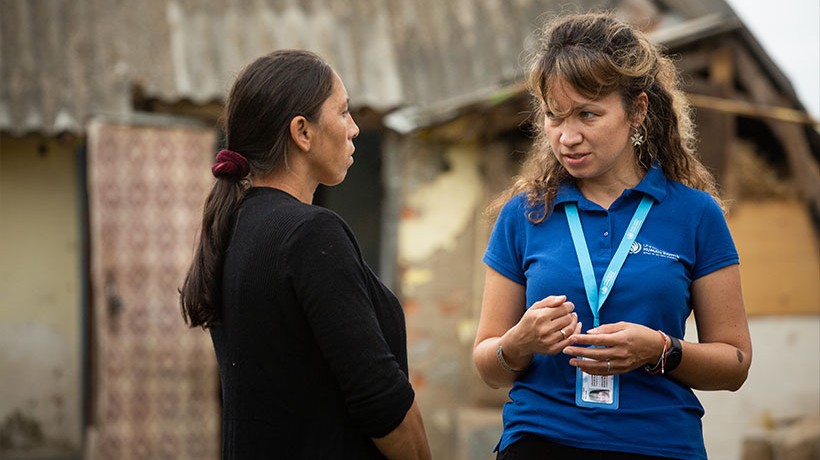
Working closely with communities. Juliana Abramova, Program Manager at UN Human Rights Moldova, with a Roma family. © OHCHR/Vincent Tremeau
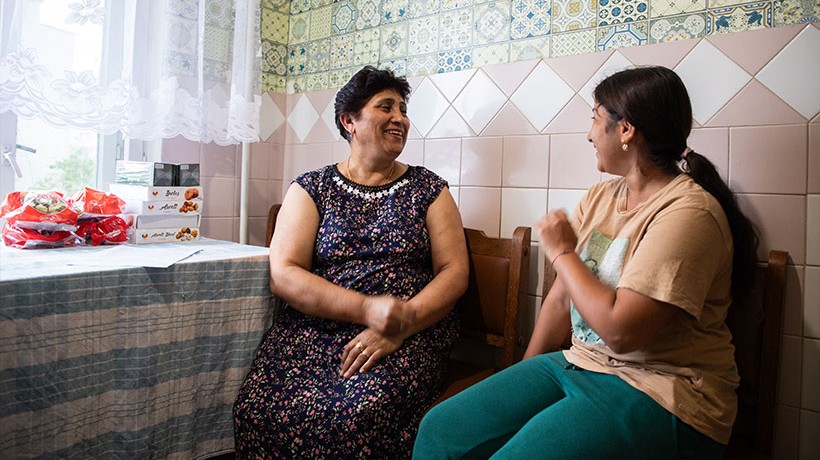
Roma mediator Vasilisa Avtutova (left) shares a laugh with Inna in the family’s kitchen. Female Roma mediators are affectionately known as “aunties” because of their close personal links with the families. © OHCHR/Vincent Tremeau
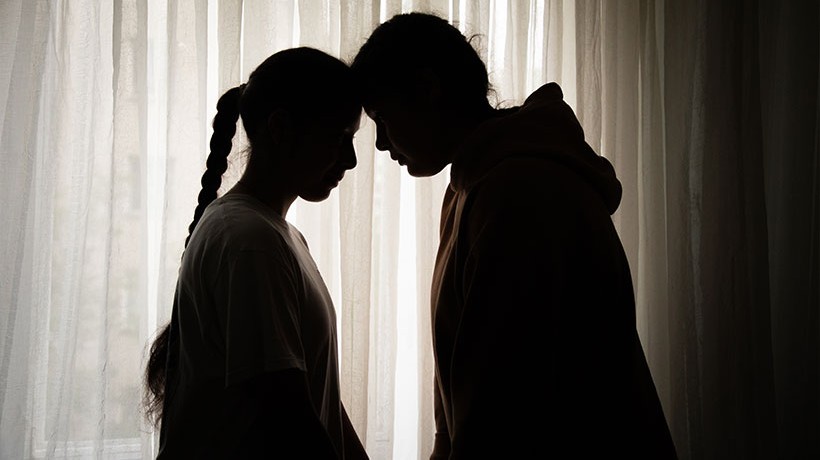
Sisters Sasha and Stephania, both Roma refugees from Ukraine, can go to school and stay together after a Roma mediator helped the family obtain legal guardianship and enrolled them at the local school. © OHCHR/Vincent Tremeau
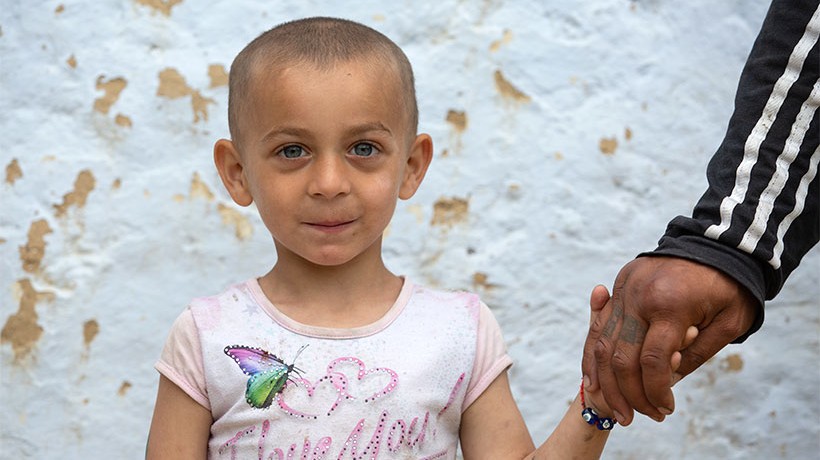
Vaccination rates have gone up and school dropout levels are down among Roma children on the left bank of the Nistru/Dniester river thanks to the services of Roma community mediators. © OHCHR/Vincent Tremeau
Refugees
While Roma face a plethora of discrimination and inclusion problems, the situation for those who happen to be refugees can be even more challenging. This is the case of Inna and her two adolescent nieces.
Sasha and Stephania are from neighbouring Ukraine. The two girls fled the war in the company of their mother in 2022 and moved in with Inna, the sister of the girls’ mother.
However, the mother died shortly after from a heart disease. Since then, Inna has been trying to obtain legal guardianship of Sasha and Stephania, fearing they will be taken away from her and sent to an orphanage. Because the girls had no legal documents, it has been an uphill battle for the family.
“I want the girls to have a future,” said Inna, 30, who lives in a humble apartment in the town of Bendery on the left bank of the Nistru/Dniester river with the two girls and her husband, an informal construction worker.
“I want them to study and get a diploma and support each other and stay always together. They have already suffered a lot. I love these girls as if they were my daughters. Sometimes I don’t eat to give food to them,” she said.
A Roma mediator, Vasilisa Avtutova, found out about the case through UN Human Rights Moldova, and has been helping the family sort out the guardianship documents and obtain the papers needed for the girls to attend the local school. Inna said she could not have done it alone, as she had no confidence in communicating with different local structures nor all her legal documents in order.
After months of filing administrative papers and pleading with local structures, Auntie Vasilisa, as she is known in the family, recently managed to obtain the guardianship documents for the girls. Sasha, 16, and Stephanie, 14, now both attend school, and the family started to receive social benefits in July 2024.
“I cannot image how these Roma families could have solved their problems without mediators. Even for us it is not easy,” said Avtutova, who has been a Roma mediator for three years.
“The Roma project is like a light inside a tunnel.”

Inna had been fighting to obtain legal guardianship of her two nieces after the death of the girls’ mother. © OHCHR/Vincent Tremeau
“
Thanks to the partnership with UN Human Rights and the training sessions, I have learned where I can go to protect the rights of the Roma people.
“
RAISA DEMENIUK, ROMA COMMUNITY MEDIATOR

